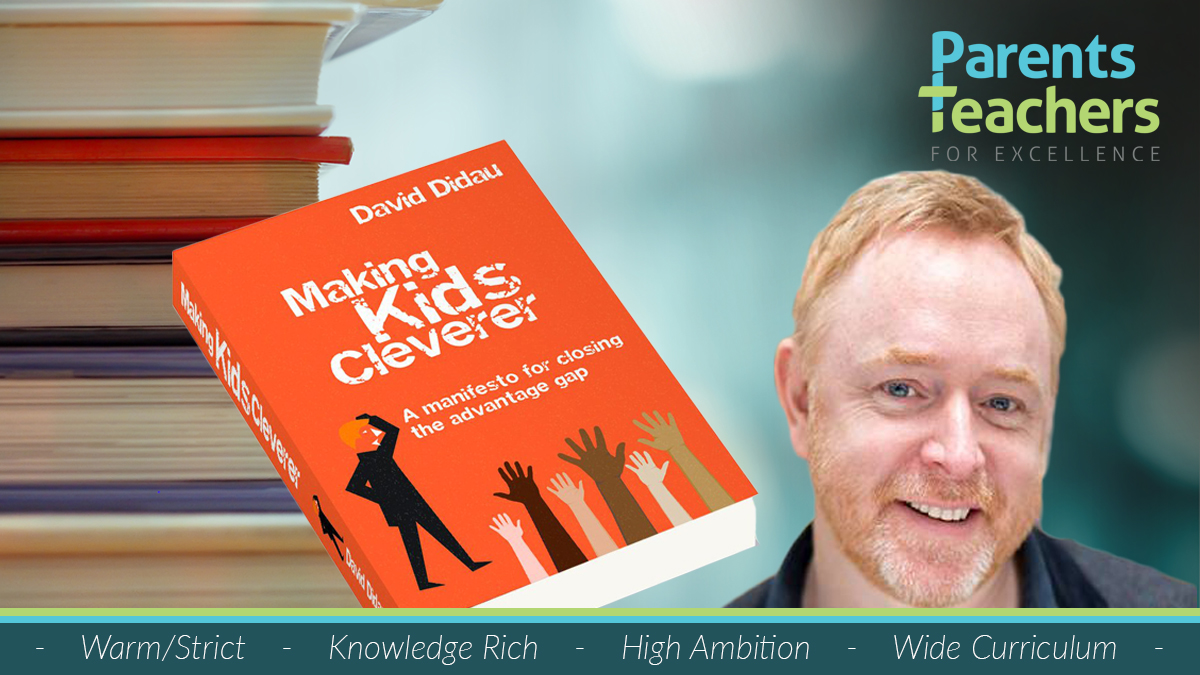The PTE Newsletter – Friday 21 May
Well, that’s another week supporting children nearly done, and another week closer to half term. There is still lots of school-related news, but not so much of it making the mainstream headlines – which is no bad thing at all. It’s also a sign of the positive impact made by everyone’s efforts to keep the show on the road this term.
Book review – “Making Kids Cleverer”
David Didau is an extremely charismatic and compelling teacher, trainer, and writer. In the early stages of the post-2010 school reforms in England his “The Learning Spy” blog was one of the most influential ones in terms of changing the nature of the debate had by teachers and policy makers alike.
He also wrote a number of well-received books, including “What If Everything You Knew About Education Was Wrong?” in 2014. However, 2019’s “Making Kids Cleverer” is probably the book where the most important ideas, research, and evidence are pulled together in “a manifesto for closing the advantage gap” – and what a manifesto it is!
Not enough education books manage to make their case so well or in such a systematic and informed manner, relying instead on anecdote or emotional persuasion. “Making Kids Cleverer” has plenty of the latter but these are the cherries on the cake – David lays out his thinking in a clear and logical way, alongside the necessary research evidence as it stands, so that the reader can see how it all fits together.
“The purpose of education” chapter looks at different reasons given for educating kids and concludes that:
“…whatever you believe, all endeavours are strengthened when imbued with a sense of purpose… I will build the case that if we focus education on making kids cleverer, all else is likely to follow.”
So whether it’s about making children nicer, or intergenerational transmission of ideas, or preparing them for the 21st century workplace – he argue that making kids smarter is probably the best way to achieve it. Read more
Latest news & views
A new survey by Ofsted has found that 9 out of 10 parents think that their child’s school has handled the pandemic well. Amanda Spielman said the survey highlighted “just how much parents appreciate the huge effort and creativity schools have shown to help them educate their children at home”.
Ofsted’s national director of education Sean Harford is to stand down from his role to take early retirement. Harford has worked at Ofsted since 2003, initially as an HMI and then in a number of management roles. He has been in his current role since 2015 and, among other things, led the way at Ofsted in embracing social media and engaging the sector through it.
In Scotland, the NASUWT teaching union has claimed that in “too many schools, verbal and physical abuse against teachers is going unchallenged”. Its General Secretary Patrick Roach has said that restorative behaviour policies used to deal with some incidents – which prioritise attempts to discuss and resolve conflict – are “becoming synonymous in too many cases with no punishment or sanctions for unacceptable behaviour”.
The government’s education catch-up tsar has said that parents’ evenings are likely to remain virtual beyond the pandemic. Speaking to the Lord’s Youth Unemployment Committee he said that video calls were a “better way” to conduct the evenings. “The way that schools do parents’ evenings I don’t think will ever be the same again,” he said.
He also said that he thought that any plans to extend the school day should be compulsory – in order to “guarantee” disadvantaged pupils attend: “the more voluntary things are, the less likely they’re going to get to the hard-to-reach bits of your community”.
Students perceived as more ‘agreeable or conscientious’ may be awarded higher grades, according to a study of teacher assessment involving researchers at Queen’s University Belfast and Goldsmiths College, University of London. They examined how the personalities of students compared with grades awarded by teachers and then their written exam results, and found that those with personality traits seen as more positive – such as more sociable, well-behaved and “agreeable” – received a boost in teachers’ grades, which were not then borne out by performance in anonymous exams.
Ofsted has warned that too few initial teacher education (ITE) partnershipshave a “sufficiently ambitious” curriculum for their trainees, and “too many” are over-reliant on school placements to teach content. Ofsted used the spring term to research how partnerships responded to the pandemic and how the curriculum has changed since the new inspection framework for ITE was unveiled.
On the opinion front, in CapX Tim Wood outlines “Seven practical ways to level up schools”. Among the seven approaches covered are strong discipline, a wider enrichment curriculum, and high ambitions – things PTE can get behind. And there is of course the compulsory mention of Michaela and Mossbourne schools…
Over in the TES, teacher Emma Stokes has written about why she will be keeping her classroom in rows even though COVID guidance changes mean that she could return them to previous grouped arrangements. Heart warming!
Sir Alan Wood, recovery tsar Kevan Colins’ chief advisor, says in Schools Week that the journey through recovery must lead to reform: “the pandemic has highlighted long-standing weaknesses in our education system, including assessment, accountability, curriculum, support for pupils’ wellbeing and pupil underachievement. So we must look beyond simple recovery and open a sector-wide discussion on reform.” It will be interesting to see what comes along in this regard.
That’s it for this week – have a wonderful weekend!
